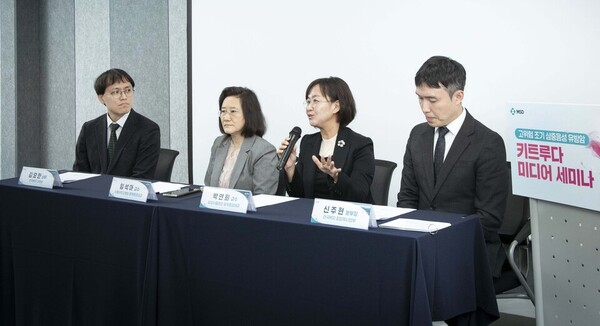MSD's anti-PD-1 cancer immunotherapy Keytruda (pembrolizumab) has recently established itself as a versatile treatment option for triple-negative breast cancer. However, patient access in Korea has faced several challenges.
At the European Society for Medical Oncology Annual Congress (ESMO 2024) in September, Keytruda presented overall survival (OS) data from the phase 3 KEYNOTE-522 study, highlighting its survival benefit as perioperative adjuvant therapy.

Keytruda has already demonstrated improved OS in combination with conventional chemotherapy for advanced patients in the KEYNOTE-355 study. In the KEYNOTE-522 study, it further showed survival benefits for locally advanced patients, establishing itself as the only treatment to enhance outcomes across all stages of triple-negative breast cancer.
While breast cancer generally has a high survival rate, triple-negative breast cancer has a comparatively poor prognosis. The five-year relative survival rate for triple-negative breast cancer is 91 percent at the localized stage but drops sharply to 12 percent at the metastatic stage. In comparison, the 5-year relative survival rate for all breast cancers is 99 percent at the localized stage and 31 percent at metastasis.
Compared to other subtypes, triple-negative breast cancer has more early recurrences and a poorer prognosis, likely due to the absence of therapeutic targets, such as hormone receptors or HER2, leaving no specific treatment options available.
Triple-negative breast cancer also affects a higher proportion of younger patients under the age of 50, who are often socially and economically active, compared to other subtypes. This highlights the need for aggressive early treatment to prevent metastasis and recurrence and to improve survival outcomes.
In this context, the role of Keytruda, which has emerged as a new global standard in the treatment of triple-negative breast cancer, has become increasingly significant.
However, for Korean triple-negative breast cancer patients, KEYTRUDA treatment remains inaccessible.
Keytruda was approved by the Ministry of Food and Drug Safety (MFDS) in July 2021 for the treatment of patients with PD-L1 expression-positive (CPS≥10), inoperable, locally recurrent, or metastatic triple-negative breast cancer in combination with chemotherapy. In July 2022, it was approved for the treatment of patients with high-risk early-stage triple-negative breast cancer in combination with chemotherapy as a neoadjuvant before surgery and then as a monotherapy as an adjuvant after surgery.
However, to date, Keytruda is not covered by health insurance for these patients.
Last year, MSD Korea submitted a bulk reimbursement application for 17 indications for Keytruda, including breast cancer; however, the application has been pending for over a year.
Recently, MSD Korea resubmitted its reimbursement proposal for Keytruda to the Korea Health Insurance Review and Assessment Service (HIRA). Unlike the company's original application, the government selected only a few indications for Keytruda to establish the reimbursement criteria and has requested that the company resubmit the reimbursement plan.
It is currently unknown whether triple-negative breast cancer is among the indications selected by the government.
Some industry watchers believe that if triple-negative breast cancer is included, it is more likely to be an indication for advanced patients rather than early-stage patients, given the relatively small number of advanced patients and the precedent that coverage is typically reserved for late-stage disease.
However, local breast cancer experts believe that while both indications are urgently needed, the demand for Keytruda in early-stage patients is even greater. This is because patients at earlier stages have higher PD-L1 expression and thus benefit more from immuno-oncology drugs.
In addition, the relatively younger age of Korean triple-negative breast cancer patients, along with the treatment goal of achieving a cure in early-stage disease, supports the earlier use of Keytruda.
Furthermore, Korean patients do not have free access to carboplatin, a globally used treatment for early-stage triple-negative breast cancer, which further heightens the unmet need for Keytruda.
Park Yeon-hee, a professor of hematology-oncology at Samsung Medical Center, noted at a recent Keytruda media seminar hosted by MSD Korea that “the current pathologic complete response (pCR) rate in Korean patients may be lower than the control group in the KEYNOTE-522 study.”
The backbone chemotherapy regimen used in the KEYNOTE-522 study was the combination of carboplatin plus paclitaxel, followed by doxorubicin or epirubicin plus cyclophosphamide. However, carboplatin is not available in Korea for the treatment of early triple-negative breast cancer, resulting in patients receiving treatment that is inferior to that of the actual control group.
“Currently, if carboplatin is to be used for preoperative adjuvant therapy in early triple-negative breast cancer patients, it must be used off-label at the patient's expense through prior application,” said Seok-ah Im, a professor of hematology-oncology at Seoul National University Hospital, during the media seminar. “If it is difficult to cover Keytruda (with national health insurance), then only the backbone chemotherapy, including carboplatin, should be covered.”
Related articles
- Experts warn of serious side effects of cancer immunotherapies, including lung disease, hormonal disruptions
- Phase 3 study shows Keytruda's potential in endometrial cancer, though high costs pose barriers
- ABL Bio partners with MSD for ABL103+Keytruda combo study in solid tumor
- [ESMO 2024] MSD remains cautious about when Keytruda’s SC formulation comes to market
- MSD’s Keytruda OKed as 1st line treatment of advanced endometrial cancer in Korea
- 'High-intensity post-surgery imaging for breast cancer does not improve survival rates'
- MSD Korea exec appointed as commercial strategy & operations director for MSD ANZ
- MSD launches phase 3 Keytruda combo trial in tough-to-treat endometrial cancer in Korea

